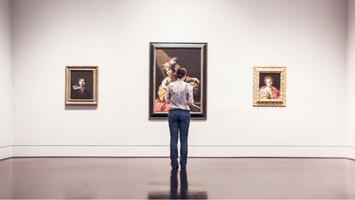Did you love art class as a kid? Do you use every inch of paper to doodle? Do you love visiting interesting museums and exhibits? Do you look at the design of a website or graphic and wonder how it was made? If so, becoming an arts major in college may be right up your alley.
What is an arts major?
An arts major in an interdisciplinary major, weaving together multiple academic subjects like art history, painting, sculpture and photography. Additional areas of study include subjects like the business of visual arts and art therapy.
Is it right for me?
Before you start majoring in the visual arts, there are several important considerations to think about. Arts major don’t necessarily create art all the time, and there could be financial ramifications as well.
Here are several key questions to ask yourself before you officially declare yourself an arts major:
- Am I prepared for the financial costs of being an arts major, including paying for art supplies or traveling to museums or exhibits and paying fees for those?
- Am I okay with taking academic classes as well as art classes?
- Do I have a thick skin? Am I able to take and incorporate constructive criticism I receive from professors and peers?
- Am I prepared to spend much of my course of academic study alone working on my art?
- Do I enjoy spending a great deal of time visiting museums and exhibits and looking for inspiration elsewhere?
What can I do with an arts degree?
Just because you major in visual arts doesn’t necessarily mean you have to become a “starving artist,” creating your own exhibits and selling pieces. While that’s definitely a valid career option, there are other ways to make your arts degree applicable.
Some potential career paths include:
- art professor
- art therapist
- graphic designer
- advertising executive
- art critic
- fashion designer
- textile designer
- museum, gallery or exhibit curator
- art educator
- gallery owner
- filmmaker
- photographer
- photojournalist
What do artists earn?
Pursuing a career in visual arts isn’t necessarily known to be lucrative, and salaries vary wildly depending on where you live, what you do and how much work you take on at any given time.
“Fine artists” like painters, sculptors and illustrators usually make starting salaries around $40,000-$60,000 if they have steady work, whereas people in other art-related careers may make more or less depending on the type of work and how consistent it is (for example, the average annual salary for a graphic designer is $41,000 a year while the average salary for a museum curator is $53,000).
Next, learn more about this college major such as Computer Science and get more career tips for internships and entry-level jobs such as How to Get a Letter of Recommendation.


